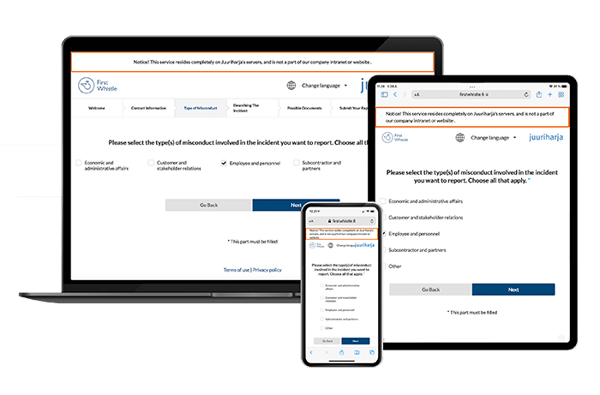
First Whistle - An easy-to-use and reliable whistleblowing channel
How do I blow the whistle?
Whistleblowing channel mandatory for all organisations with 50 or more employees
The EU Directive, adopted in autumn 2019, obliges all organisations employing more than 50 people to provide a whistleblowing channel for both staff and a range of external stakeholders.
A whistleblowing channel is therefore a legal obligation. The aim of the law is to protect people who raise concerns about wrongdoing.

What does whistleblowing mean?
Whistleblowing is the disclosure by an organisation’s members (former or current) of illegal, immoral or illegitimate practices under the control of their employers, to persons or organisations that may be able to effect action.
Using the First Whistle whistleblowing channel all members of the organisation and many external stakeholders can report suspected wrongdoing.
The First Whistle supports anonymous reporting.
FIRST WHISTLE IS:
- Compliant with legal requirements of whistleblower protection
- Secure, accessible, reliable and easy to use
- GDPR compliant
- Built to minimise human risk:
- easy and clear process for the whistleblower to file a case
- automation and guidance for the case managers to prevent mishaps in case management, e.g. deleting data
It is always good to voice a concern
With hindsight, it is sometimes easy for an organisation to identify the chain of events that led to the realisation of an ethical risk.
Your reporting will help the persons responsible to be alerted. The first thing to do is to talk things through. However, if you do not want it to be known that you are the one voicing the concern, then reporting it through the First Whistle is a good option.
Culture, whistleblowing and code of conduct
Organisational culture is easier to shape when you only have to tweak it a little. A big change is a big job. That's why it's often worth tackling phenomena while they're still just about harmless.
The whistleblowing system is an integral part of the company's GRC system and the development of an ethical organisational culture.
It is helpful if the organisation has defined a code of conduct. A set of principles will help to clarify which activities and behaviours the organisation wants to reinforce and which it does not.
What if I report to the wrong channel?
You should check your organisation's guidelines on what belongs in which channel. Often, for example, it's a good idea to discuss employment issues with HR, etc.

ANONYMOUS WHISTLEBLOWING
You can make a notification on the device of your choice, easily and securely. First Whistle works on mobile, tablet, and computer screens.
You can report anonymously or, if you prefer, you can provide your own contact details. First Whistle does not store any information about you unless you provide it. This also applies to technical identifiers, such as the IP address.
At the end of the reporting process, you will receive a personal code that will allow you to return to First Whistle to check the status of the report and to answer any questions addressed to you.
ANONYMOUS COMMUNICATION
Case managers will receive an alert in their email when a new case is filed, and will know to come and read the report as soon as their work situation allows. They can send you questions through First Whistle.
NOTE: First Whistle will not send you email or other messages, you will need to come into the system on your own initiative to see if there are any messages for you.
I'm not sure what I saw, whether wrongdoing took place
The aim of the Directive is to bring wrongdoing to light at an earlier stage. To facilitate reporting, whistleblowers are guaranteed strong protection against discrimination and any retaliation. The protection applies not only to employees, but also to job applicants, former employees and subcontractors, for example. This means that a very wide range of people can report.
In life, things happen. We gather sensory information about our environment all the time. When we hear or see something in passing, we interpret it and draw conclusions from our past experiences. We may also interpret what we see as something questionable and report it as a sign of misconduct. It may be that we saw correctly, but it may also be that we misinterpreted the situation. Either way, it is important to raise the issue so that it can be investigated and then wait calmly for the investigation to proceed. During the investigation, you will have the opportunity to answer questions from the case managers.
You should not intentionally make an unsubstantiated report of misconduct. The law requires you to make a report honestly and in good faith.
What if someone blows the whistle on me?
Any member of an organisation can be the subject of a report and the possibility of being the subject of a report is of concern to many. Research evidence - and our own experience supports these findings - suggests that very few reports are filed with the intention to harm. Misinterpretations of situations do occur and this can lead to the generation of a false report, which is then found to be unfounded following a good investigation.
When a whistleblowing report implicates you, it is important to wait calmly for the investigation to progress.
What can I do to defend myself
Do not interfere with or try to influence the case management process in any way. As part of the investigation, you will be able to share your perspective and knowledge through the First Whistle.
What if someone wants to report me with malicious intent? If you start to suspect or know that someone has blown the whistle on you, even with intent to harm you, it is good to remain calm. Make sure you do not interfere or influence the investigation in any way. Also be careful not to become negative towards someone because you think they are the one who reported you. Also, do not put pressure on the (supposed) whistleblower to withdraw her/his/their report. The report may turn out to be unfounded, but these above mentioned actions by yourself around the handling of the report would have been illegal.
The best defence is prevention. Comply with laws and regulations, as well as your employer's code of conduct.

“The best defence is prevention. Comply with laws and regulations, as well as your employer's code of conduct."
Thinking about blowing the whistle?
The world around us is changing faster than ever and new threats are on the horizon. It is easier and more cost-effective to solve problems proactively than to act after the event. So it pays to report early and sensitively.
Have you tried raising the issue first? Speaking up often moves things forward more quickly than reporting, because then things can be discussed directly. If you feel it would be too much of a risk, a whistleblowing channel is a good option.
Through the whistleblowing channel, you can report anonymously. First Whistle does not store metadata related to whistleblowing and does not track the IP address of the whistleblower. After submitting a report anonymously, the whistleblower will receive an identifier that will allow them to come back and provide additional information, as well as answer questions from the handlers.
Reports must always be made honestly and in good faith.
How to do it, step-by-step
- Write down the key facts you want to report. What happened, when it happened and what you saw. Make a distinction between what you know and what you think.
- Find the address (URL) of the channel on the website of the organisation (your employer or other organisation you want to report).
- Copy the address into the address field of your browser and go to the channel.
- First Whistle will guide you to make a good report. Read the instructions and follow the process.
- Finally, be sure to capture your personal code, which will allow you to provide additional information, ask questions about the progress of the investigation, and read the follow-up questions addressed to you.
- You will receive messages from the people handling the report within First Whistle. Remember to log back in using your code to view and respond to questions and other comments.
- Three months after your report, you have the right to know the outcome of the investigation. Alternatively, you may have been told that the investigation period has been extended for legitimate reasons.

